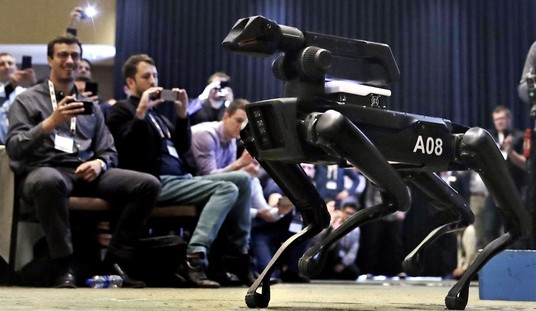9 p.m. ET all across the dial except for Fox, which will carry Game 7 of the NLCS. Between that and “Monday Night Football,” it’s a lead-pipe cinch that this will be the lowest-rated of the three debates, especially since people typically don’t vote based on foreign policy anyway. This “Onion” preview of the debate captures the stakes reasonably well, notwithstanding John Kerry’s pre-debate spin that tonight is a “reckoning” for Romney because he’s been, ahem, inconsistent on the issues.
For what it’s worth, I completely agree with Jonah Goldberg:
Foreign policy, the ostensible subject of tonight’s debate, is not as conducive to sweeping statements of ideological principle as domestic policy is these days. Americans are weary of war, wary of the Arab Spring, and fed up with many of the hassles and perceived economic hardships that come with being the leader of the world. By no means do I think Romney should back off principled disagreements with Obama. But the voters Romney needs don’t much care about winning the argument over Libya or the the war on terror generally. They want to hear (or, rather, Romney needs them to hear) why they shouldn’t be worried about Romney being commander-in-chief. That kind of reassurance comes from seeming reasonable above all else. The price for that may be to say “I agree with President Obama” more than I would like and framing things in such a way that Obama is the one who’s forced to seem un-reassuring. To that end, on Libya, like so many other issues, Romney should calmly make his case and let Obama get angry in response.
A little Ron Paul tonight would go a long way. I don’t want to see Romney turn isolationist, but between the Benghazi attack, the rising Islamist tide in Egypt, the maelstrom in Syria, and the decade-long drift in Afghanistan, there are a lot of undecideds out there who might perk up tonight if he signaled that it’s time to pull back a bit from the Middle East. S.E. Cupp gave him the same advice on MSNBC today, encouraging him to critique Obama on drone strikes and the “kill list.” Does Mitt have that in him, though? Many of his foreign-policy advisors are Bush veterans and Romney’s big knock on O in international affairs has always been that you can’t lead from behind. He’s embraced a “peace through strength” message, which means we’re more likely to see marginal disagreements on the hawkish/interventionist end of the spectrum tonight than the starker disputes of the sort you see between them on the economy. For what it’s worth, though:

If he’s going to try to out-interventionist Obama, he’d better come prepared with arguments for why O’s chosen interventions weren’t such hot ideas. Topic A tonight is likely to be Benghazi, with Romney tempted to get down in the weeds about what Obama knew and when. That’ll be difficult: The White House spent the weekend leaking to reporters about the early confusion over what happened at the consulate, with both Obama himself and Susan Rice supposedly being briefed that the attack was spontaneous until 10 days afterward. O wanted that out there so that he could point to those news stories at the debate, of course. (Another pair of leaked stories on Saturday claimed that Al Qaeda had no ties to the attack and also that militants tied to Al Qaeda participated in it.) Team Romney was needling him before the debate this afternoon about the shifting narrative, but that’s not the deeper foreign-policy point here. The deep point is that O (a) undertook a dubious intervention in Libya without congressional approval, (b) failed to anticipate how it would empower Islamists in Africa, including/especially in Mali and Syria, as Qaddafi’s arsenal of weapons like shoulder-fired missiles was expropriated, and (c) then inexplicably left the U.S. ambassador without security, leading to his murder and a new counterterrorism crisis for the U.S. that may end up alienating our new “friends” in Libya once we strike back. More from Danger Room:
But several aspects of his foreign policy have either skirted on the edge of disaster or risk tipping over into them, whether it’s the surge and ensuing the drawdown from Afghanistan; or his inconsistent approach to the Arab Spring, where he’ll intervene in Libya but not Syria. Indeed, Libya looked like the successful ouster of a dictator with no U.S. casualties, but it turned out the U.S. neglected the warning signs of Islamist resurgence in eastern Libya until it murdered four Americans.
Benghazi resonated because it pierced that veneer of competence. It’s reasonable to wonder if there are about to be several Benghazis on Obama’s watch, whether in the form of raided Mideast embassies or Taliban advances or an Iranian nuke. Obama’s most urgent task in this debate is to explain why there won’t be.
That’s Romney’s task tonight. Pierce the veil of competence with which the Foreign Policy President surrounds himself — here’s a good place to start — and leave an impression of competence yourself, especially by having a smart answer ready when Schieffer inevitably asks how your foreign policy differs from Bush’s. (That would make a fine question for President Drone Strike too, needless to say.) Below you’ll find the handy dandy Hot Air/Townhall Twitter widget for live-tweeting. I’ll leave you with this from Walter Russell Mead:
Above all, Governor Romney wants voters coming away from this debate with the impression that he would be a “safe pair of hands.” He’s tough enough to do what’s necessary, but laid-back enough not to do too much. If he’s attacking the President’s policies, it isn’t because he wants to bring Donald Rumsfeld and Richard Cheney back inot the Situation Room. As far as possible, Governor Romney wants to impress voters tonight that a vote for him is a vote for safety, peace and a quiet life. The world is scary enough these days; Americans aren’t looking for a scary President.








Join the conversation as a VIP Member